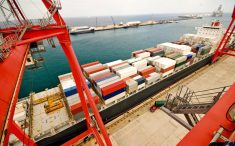Bulk grain traffic through the Port of Montreal isn’t expected to be affected by a longshoremen’s strike that began Monday morning, but eastbound containerized crops may be among the traffic put on hold.
CUPE’s Syndicat des debardeurs Local 375, which represents about 1,150 longshoremen and longshorewomen at the port, served notice Friday that it would launch an “indefinite” strike Monday morning.
The indefinite strike followed a series of four brief strikes last month, the most recent of which ran July 27-31.
The Montreal Port Authority said Friday the strike means the “suspension of berthage services normally provided by longshoremen (and) longshorewomen and the handling of goods in the Port of Montreal terminals.”
Read Also

U.S. grains: Soybeans bounce as Chinese demand assessed, wheat drops
Chicago soybean prices firmed on Friday in a bargain-buying bounce after a sharp fall on Thursday, as traders assessed prospects for more U.S. sales to China after the trade war truce between the countries.
The work stoppage doesn’t affect Viterra’s 262,000-tonne capacity grain terminal at the port. The federal Labour Code calls for port workers during a strike or lockout to “continue to provide the services they normally provide” for loading, tie-up, let-go and movement of grain vessels in and out of port.
Liquid bulk handling will also not be affected, the port authority said — nor will Oceanex services through the port’s Bickerdike terminal, which handles traffic bound for Newfoundland and the Magdalen Islands.
However, the strike is expected to affect traffic through Montreal’s container terminals, including the CanEst Transit terminal devoted to storage, cleaning, sifting, packing and loading of agricultural products.
According to the port authority, the CanEst terminal — whose ownership group includes Quebec ag co-operative Sollio and Regina pulse and durum processor AGT — loads about 200 containers per day at a rate of about eight per hour on average.
The facility is served by both Canadian National and Canadian Pacific railways, and includes 91 silos with a total capacity of 68,000 tonnes.
A port spokesperson confirmed Monday via email that the strike stops work at CanEst. An AGT representative said via email that the company would not comment on the matter.
‘Intervention’ sought
The last collective agreement between port workers, represented by CUPE 375, and the Maritime Employers Association representing terminal operators expired at the end of December 2018. According to the union, the main obstacle in talks is worker scheduling as it relates to “work/life balance.”
CUPE representative Michel Murray, in a separate release Monday, said the union plans to keep working with a mediator and keep channels open to discuss a truce that would allow work at the port to resume.
The port authority said Friday it’s “very concerned about these work stoppages affecting public health and safety during a global pandemic, as port operations are essential to keep the economy running smoothly and to supply food and other essential products.”
The port authority warned a strike will “create long delays in handling goods for Canadian companies, especially exporters” and “oblige many export companies to lease warehouses or choose a different supply chain, if they are unable to move their goods internationally out of the Port of Montreal.”
The strike may also lead international shipping firms “to re-route certain vessels, sometimes to competing U.S. ports, resulting in higher costs for businesses and, ultimately, consumers.”
Several Quebec business organizations called jointly Monday for “immediate intervention” by the federal government to end the strike.
“Think about Quebec’s independent food producers, or about supply chain issues: the impacts will be widespread throughout the regions and they will have terrible consequences,” Karl Blackburn, CEO of the Conseil du patronat du Quebec, said in those groups’ release.
Federal Labour Minister Filomena Tassi, in a separate statement Monday, said she and Transport Minister Marc Garneau “have reached out to both parties to convey our expectation that they focus their efforts on reaching an agreement and avoid further disruption.”
In her statement, Tassi appeared to rule out any federal intervention beyond the government’s offer of continued help from the Federal Mediation and Conciliation Service. “We have faith in the collective bargaining process, as we know the best deals are made at the table,” she said.
“It is in reaching a negotiated agreement that normal functions can return at the port, and anything that delays the bargaining process is disappointing and harmful to both the local and national economies.” — Glacier FarmMedia Network















